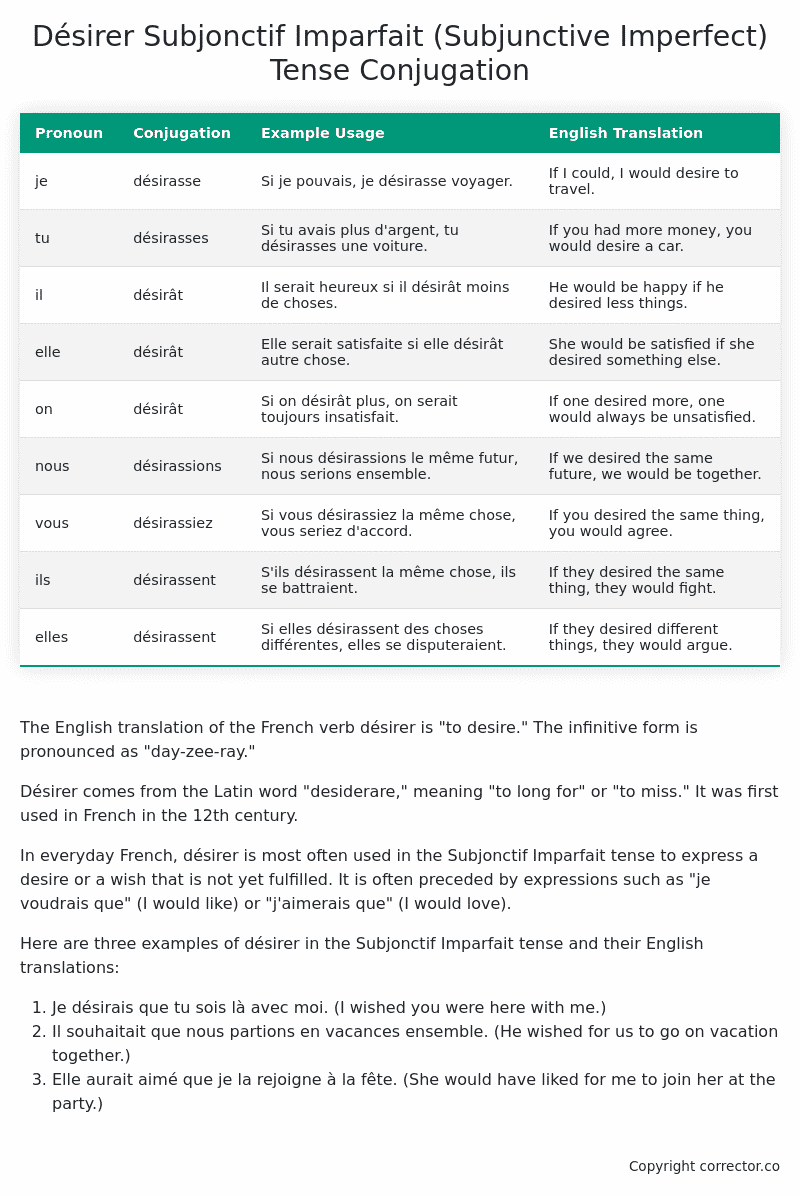Subjonctif Imparfait (Subjunctive Imperfect) Tense Conjugation of the French Verb désirer
Introduction to the verb désirer
The English translation of the French verb désirer is “to desire.” The infinitive form is pronounced as “day-zee-ray.”
Désirer comes from the Latin word “desiderare,” meaning “to long for” or “to miss.” It was first used in French in the 12th century.
In everyday French, désirer is most often used in the Subjonctif Imparfait tense to express a desire or a wish that is not yet fulfilled. It is often preceded by expressions such as “je voudrais que” (I would like) or “j’aimerais que” (I would love).
Here are three examples of désirer in the Subjonctif Imparfait tense and their English translations:
- Je désirais que tu sois là avec moi. (I wished you were here with me.)
- Il souhaitait que nous partions en vacances ensemble. (He wished for us to go on vacation together.)
- Elle aurait aimé que je la rejoigne à la fête. (She would have liked for me to join her at the party.)
Table of the Subjonctif Imparfait (Subjunctive Imperfect) Tense Conjugation of désirer
| Pronoun | Conjugation | Example Usage | English Translation |
|---|---|---|---|
| je | désirasse | Si je pouvais, je désirasse voyager. | If I could, I would desire to travel. |
| tu | désirasses | Si tu avais plus d’argent, tu désirasses une voiture. | If you had more money, you would desire a car. |
| il | désirât | Il serait heureux si il désirât moins de choses. | He would be happy if he desired less things. |
| elle | désirât | Elle serait satisfaite si elle désirât autre chose. | She would be satisfied if she desired something else. |
| on | désirât | Si on désirât plus, on serait toujours insatisfait. | If one desired more, one would always be unsatisfied. |
| nous | désirassions | Si nous désirassions le même futur, nous serions ensemble. | If we desired the same future, we would be together. |
| vous | désirassiez | Si vous désirassiez la même chose, vous seriez d’accord. | If you desired the same thing, you would agree. |
| ils | désirassent | S’ils désirassent la même chose, ils se battraient. | If they desired the same thing, they would fight. |
| elles | désirassent | Si elles désirassent des choses différentes, elles se disputeraient. | If they desired different things, they would argue. |
Other Conjugations for Désirer.
Le Present (Present Tense) Conjugation of the French Verb désirer
Imparfait (Imperfect) Tense Conjugation of the French Verb désirer
Passé Simple (Simple Past) Tense Conjugation of the French Verb désirer
Passé Composé (Present Perfect) Tense Conjugation of the French Verb désirer
Futur Simple (Simple Future) Tense Conjugation of the French Verb désirer
Futur Proche (Near Future) Tense Conjugation of the French Verb désirer
Plus-que-parfait (Pluperfect) Tense Conjugation of the French Verb désirer
Passé Antérieur (Past Anterior) Tense Conjugation of the French Verb désirer
Futur Antérieur (Future Anterior) Tense Conjugation of the French Verb désirer
Subjonctif Présent (Subjunctive Present) Tense Conjugation of the French Verb désirer
Subjonctif Passé (Subjunctive Past) Tense Conjugation of the French Verb désirer
Subjonctif Imparfait (Subjunctive Imperfect) Tense Conjugation of the French Verb désirer (this article)
Subjonctif Plus-que-parfait (Subjunctive Pluperfect) Tense Conjugation of the French Verb désirer
Conditionnel Présent (Conditional Present) Tense Conjugation of the French Verb désirer
Conditionnel Passé (Conditional Past) Tense Conjugation of the French Verb désirer
L’impératif Présent (Imperative Present) Tense Conjugation of the French Verb désirer
L’infinitif Présent (Infinitive Present) Tense Conjugation of the French Verb désirer
Struggling with French verbs or the language in general? Why not use our free French Grammar Checker – no registration required!
Get a FREE Download Study Sheet of this Conjugation 🔥
Simply right click the image below, click “save image” and get your free reference for the désirer Subjonctif Imparfait tense conjugation!

Désirer – About the French Subjonctif Imparfait (Subjunctive Imperfect) Tense
Formation
Common Everyday Usage Patterns
Interactions with Other Tenses
Subjonctif Présent
Indicatif Passé Composé
Conditional
Conditional Perfect
Summary
I hope you enjoyed this article on the verb désirer. Still in a learning mood? Check out another TOTALLY random French verb conjugation!


